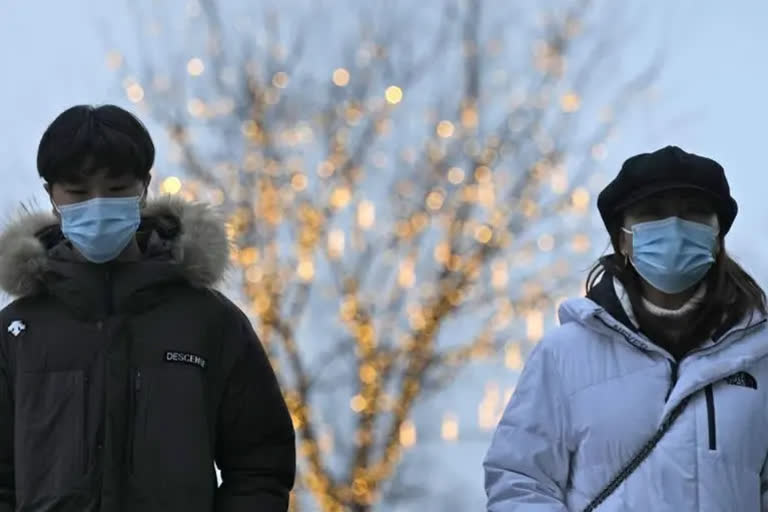Beijing: Shanghai, which is reeling under a massive outbreak of coronavirus cases, has released over 11,000 recovered COVID-19 patients from hospitals, but infection numbers continued to climb, raising questions about China's much-touted dynamic zero-case policy. Wu Qianyu, a senior official with the east Chinese city's public health commission, told a media briefing on Sunday that the patients would be put under home quarantine and no further controls should be imposed on them. "Relevant authorities in the areas they live in have to be alerted that they are allowed to go home.
At the same time, the officials are required to monitor their health (during the quarantine period)," the Hong Kong-based South China Morning Post reported. Over 11,000 recovered patients have been released, it said. But much to the disquiet of the ruling Communist Party of China (CPC) headed by President Xi Jinping, single-day new infections in Shanghai hit 24,944 on Sunday, setting a new record for the ninth consecutive day. However, positive cases dropped slightly to 1,006 from 1,015 on Saturday.
Shanghai, China's commercial and financial capital, has seen more than 179,000 cases since the current outbreak, driven by the Omicron variant, began on March 1, the Post report said. About 5,400 patients were reported to have mild symptoms, while others were asymptomatic. As the cases continue to rise, Shanghai on Saturday inaugurated 50,000 bed makeshift hospital, its largest till date, amid heightened efforts in battling Omicron, as new daily infections continued to climb, the state-run Global Times reported.
In total, Shanghai has built more than 100 makeshift hospitals with over 160,000 beds, the report said. Neighbouring cities are also on alert to stop the disease from spreading further in Yangtze Delta, one of the country's most important economic areas. Nearby cities such as Hangzhou and Yangzhou have reserved thousands of quarantine sites for accommodating infected patients and their close contacts from Shanghai to support the city's antivirus measures, the Post report said Wu Fan, a leading expert with Shanghai's COVID-19 medical team, said China should stick to dynamic zero-COVID policy rather than "lie flat", adding that antivirus measures should be properly followed to tame the virus with the lowest costs. Wu, who is also the deputy dean of the Shanghai Medical College of Fudan University, said during an interview that nobody knows how the virus will mutate in the future. She said it is possible that the virus may become less lethal yet more contagious and pathogenic, another daily The Paper reported.
Also read: Shanghai wrestles with food shortages under virus shutdown
The sudden rise of cases has led to the much-criticised lockdown of the city of 26 million people amid public criticism of the separation of children from parents in hospitals and testing centres as well distribution of food supplies to the people who were confined for days to the apartment blocks. "The tidal wave has yet to peak, and worries are that the citywide lockdown will last for another few weeks, which may cripple the local economy," said Wang Feng, chairman of Shanghai-based financial service group Ye Lang Capital. The business community is keeping a close eye on how the government will lift the lockdown, Wang told the Post.
Thousands of businesses in Shanghai, from small restaurants to big-name multinational firms, have been forced to halt production. Shanghai set an economic growth target of 5.5 per cent for 2022, but analysts believe it will miss that goal because of the Covid controls, the Post report said. At present, the Yangshan deep water port can use just more than half of its handling capacity while flights to and from the city's two airports are mostly grounded. On Sunday, the National Health Commission (NHC) reported that 27,745 close contacts of people who tested positive in different cities have been released.
Altogether 137,166 patients have been discharged from hospitals across the mainland after recovery by the end of Saturday, the NHC said. The recurring spikes of coronavirus cases in number of cities in the last few months including Xian, Shenzhen, Jilin province, Beijing, Hong Kong and now Shanghai leading to mass lockdowns raised question marks about the rigid dynamic zero-COVID policy, which China claims largely kept the country safe from the coronavirus pandemic which first emerged in Wuhan in December, 2019. On Friday, President Xi defended China's stringently implemented zero- case policy notwithstanding the spiralling cases in Shanghai and previous outbreaks in different cities.
"Against the background of the COVID-19 pandemic that rages across the world, we have put first the health of all participants, adhered to the policy of preventing the coronavirus from re-entering the country to cause a new epidemic, and strictly implemented the prevention and control measures," Xi said, addressing a gathering to honour those who have made outstanding contributions to the Beijing 2022 Olympic Winter Games and Paralympic Winter Games.
PTI



